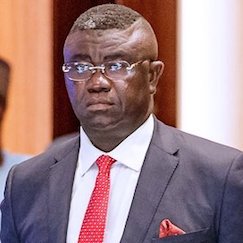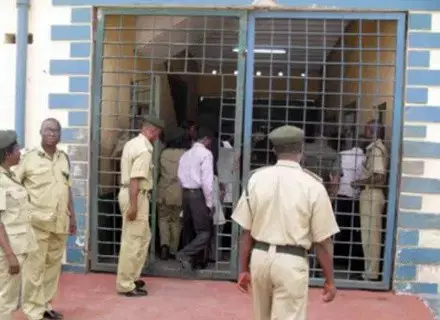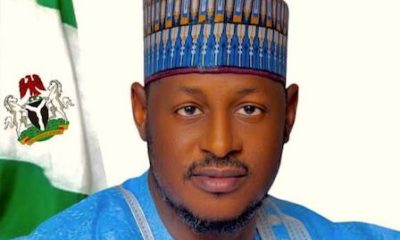COVER
FG Lists Nigeria’s Gains in OGP

By Tony Obiechina, Abuja
Minister of State, Budget and National Planning, Prince Clem Agba, yesterday said Nigeria has made remarkable achievements since joining the Open Government Partnership (OGP) in 2016.
According to him, the country has developed and implemented two National action plans organized around critical thematic areas like fiscal transparency, access to information, anti-corruption, citizen engagement, service delivery, inclusion and extractive transparency
The Minister made these remarks during the end of year Media Parley for journalists covering the Ministry in Abuja yesterday.
The OGP is a global partnership for reformers from both government and civil society who work together to make the governance process open, accountable and citizen-driven.
The Minister explained that at the core of the OGP is a commitment from participating countries to undertake meaningful new steps as part of concrete actions to deepen good governance and service delivery while empowering citizens.
He said Nigeria joined the OGP in 2016 as the 70th member as part of efforts to fight corruption and improve governance in the country.
“Since joining in 2016, the country has developed and implemented two National action plans organized around critical thematic areas like fiscal transparency, access to information, anti-corruption, citizen engagement, service delivery, inclusion and extractive transparency. The second NAP is almost rounding off and there are some modest achievements and success stories to show for it,” Prince said.
Agba pointed out that other benefits the country has derived from being a member of the OGP include, improved Budgetary Processes, improved Procurement Processes, boost in Anti-Corruption Fight through the Introduction of Transparency in Company Ownership (Establishment of Beneficial Ownership Register
“The Federal Ministry of Finance, Budget and National Planning was able to, with the 2020 federal budget, return the country to January to December budgetary cycle adding that, “We achieved the same feat in 2021 and 2022. 2023 Federal Budget will not be different.
“We hope that successive administrations will ensure that this continues. This, certainly, is not a mere annual ritual. It has assisted in early commencement of implementation of the Annual Budgets. It has also assisted the Private Sector and State Governments to Plan their Budgets to align with the Federal Government Budget. It has also led to full implementation of the Budgets especially the Capital Component.
“Significantly, it has also removed uncertainties associated with delayed budgets, which include delayed investment, thus making the implementation of government programmes and projects predictable. In fact, the early submission of the Federal Government’s annual budget enables the states to use the budget assumptions to prepare their annual budgets. Efforts are made to ensure prompt distribution of the federally collected revenues to the Federating units to enable them to implement their budgets,” Agba added.
Agba added that the country’s budgetary processes are much more transparent and participatory; as all stakeholders, especially the citizens, are carried along and enabled to make input into the process.
“Nigeria recorded its best performance in the Open Budget Survey (OBS), scoring 45% in the latest 2021 survey for transparency, indicating an improvement by 24 points, a significant leap from the 21% achieved in the previous year.
“The procurement thematic area, we have established the Nigerian Procurement Portal (NOCOPO), where citizens can monitor all government procurement processes in a transparent manner, thereby making the procurement processes a lot more open, participatory, and transparent.
“Boost in Anti-Corruption Fight through the Introduction of Transparency in Company Ownership (Establishment of Beneficial Ownership Register): Nigeria has also attained giant strides in curbing illicit financial flows, terrorism financing and corruption through the beneficial ownership process.
“The Companies and Allied Matters Act (CAMA) 2019 and Petroleum Industry Act (PIA), 2021 have provided the legal backings for the full implementation of beneficial ownership regulatory framework in Nigeria, whose provisions give effect to national beneficial ownership portal in general and strengthen the application of beneficial ownership regulations in the Oil and Gas Sector.
“Consequently, our Beneficial Ownership portal, being developed by the Corporate Affairs Commission, CAC, is our flagship instrument to curtail illicit financial flows and terrorism funding while eliminating official corruption.
The Minister disclosed that at the last OGP Global Summit in Seoul, South Korea, from December 15-17, 2021, Nigeria won the OGP Impact Award “for our commitment to Beneficial Ownership. This Global Award is in recognition of our resolve to press forward with OGP reforms”.
He also disclosed that 24 states out of the 36 states and the Federal Capital Territory (FCT) in Nigeria have so far accepted the OGP and are making concrete commitments to develop the culture of transparency and accountability in the governance processes while empowering citizens to participate effectively in governance processes.
According to him, the Abuja Municipal Area Council (AMAC) has also keyed into the OGP, making it the first local government to do so, stressing that the OGP is gradually transforming the governance ecosystem in Nigeria.
“The third National Action Plan (NAP III) being developed is expected to take forward these gains earlier outlined and introduce new steps and efforts to sustain them. Indeed, Corruption is still a big issue in the country; it is therefore pertinent that successive governments in Nigeria would sustain the OGP and even show more political support and commitment to the process”, Agba added.
COVER
FG Disburses N5.12bn Pension Arrears to 90,689 DBS Pensioners

By Tony Obiechina, Abuja
The Federal Government has released funds for the disbursement of N5.12 billion in pension arrears to 90,689 Defined Benefit Scheme (DBS) pensioners under the Pension Transitional Arrangement Directorate.This was contained in a statement by the Head of Corporate Communications of PTAD, Olugbenga Ajayi.
He said that the directorate had finalised the disbursement of the money. The Nigeria Customs Service, the Nigeria Immigration Service, and Prisons Pension Department (CIPPD) pensioners are 8,626, received N276,032, for one-month arrears; the Police, Pension Department (PPD) pensioners are 9,681, received N619,584, for two months as arrears. The Civil Service Pension Department (CSPD) pensioners are 12,773, received N408,736, for one-month arrears, and the Parastatals Pension Department (PAPD) pensioners are 59,609, received N3,814,He said that the payment reaffirms the administration’s commitment to ensuring that pensioners receive their due entitlements in line with the Renewed Hope Agenda of President Bola TinubuAccording to the statement, the approvals align with the President’s Renewed Hope Agenda.“This move shows President Tinubu’s strong commitment to senior citizens’ welfare and marks a new era in DBS pension management,” said PTAD, Executive Secretary, Tolulope Odunaiya.Among the key measures is the immediate implementation of an extra budgetary allocation to enforce new pension rates for DBS pensioners.The President also endorsed the adoption of a proposed pension harmonisation policy, which will be incorporated into the 2026 pension budget. Additionally, health insurance coverage for all DBS pensioners has been approved, ensuring access to essential healthcare services.The proposed reforms include a new pension rate of N32,000 and incremental increases of 10.66% and 12.95% for pensioners from defunct and privatised agencies. Other components of the reform package include harmonisation of pension rates across all DBS pensioners and their enrolment into the National Health Insurance Scheme (NHIS).In June, PTAD announced the successful disbursement of N8.6 billion in pension arrears to 148,625 eligible DBS pensioners across various sectors. The payments reflect the implementation of the N32,000 pension increment approved by President Tinubu in 2024.PTAD had previously settled arrears related to the first pension increment of 20% to 28%, which came into effect in January 2024.COVER
NAF Offensive Decimates 592 Terrorists, Destroys 372 Assets in Eight Months

By David Torough, Abuja
The Nigerian Air Force (NAF) has killed no fewer than 592 terrorists and destroyed 372 enemy assets in Borno within the last eight months, surpassing the total operational gains recorded in 2024.A statement by NAF’s spokesman, Air Commodore Ehimen Ejodame yesterday said the Chief of the Air Staff (CAS), Air Marshal Hasan Abubakar, said this during a courtesy visit to Gov.
Babagana Zulum of Borno. Abubakar said the offensive had destroyed 206 technical vehicles and 166 logistics hubs in deep hostile territory, with coordinated day-and-night strikes from Gonori to Rann, Dikwa to Damboa, Azir to Mallam Fatori.He said the offensive had been boosted by the deployment of A-29 Super Tucano aircraft capable of precision and night missions, Mi-171 helicopters for medical evacuation and logistics, and enhanced intelligence, surveillance and reconnaissance platforms for round-the-clock target tracking.He added that a new Mi-35 gunship was expected to further intensify close-air support for ground troops in the theatre.“Backed by an upgraded fleet and precision night-strike capabilities, NAF aircraft executed 798 combat sorties, clocking over 1,500 operational flight hours in the Air Component of Operation Hadin Kai.“This year, our air war is faster, sharper, and more surgical.“We are taking out high-value targets, crippling their logistics, and hunting down every cell that threatens the peace of the North-East,” he said.The CAS also praised the “Borno Model” of combining community-driven non-kinetic measures with decisive military action, saying it had proven effective in the counter-insurgency campaign.He also inspected facilities at the NAF Base, met with aircrew and ground personnel, and received operational briefings.He reaffirmed the NAF’s commitment to precision air power, intelligence-led operations, and inter-agency collaboration to protect Nigerians.In his response, Gov. Zulum praised the NAF for its sustained air support in degrading terrorist capabilities and protecting communities.According to him, the NAF has been a steadfast partner in their fight against insurgency.“Your operations have saved countless lives and allowed our communities to begin rebuilding.“The people of Borno recognise your sacrifices and stand firmly behind you,” he said.COVER
Over 8,000 Mentally ill Inmates in Custody Nationwide, Says NCoS

By Divine Ndukwe, Abuja
The Nigerian Correctional Service (NCoS) has disclosed that at least 8,246 inmates across the country’s custodial centres are living with mental health conditions.Assistant Controller General of Corrections in charge of Medical Services, Dr.
Glory Essien, revealed the figures yesterday in Abuja during the third public hearing of the Independent Investigative Panel on Alleged Corruption, Abuse of Power, Torture and Other Inhumane Treatment by the NCoS. Essien described incarceration as a deeply stressful experience, noting that the loss of freedom can trigger or worsen mental health conditions. She explained that inmate-leaders are trained to identify and report cases of psychological distress for early intervention, but available resources remain insufficient.“If you’re in a facility housing 500 to 1,000 inmates, with just one doctor or psychologist, monitoring everyone individually is impossible,” she said, citing logistical and funding challenges that hamper adequate care.Similarly, the NCoS Assistant Controller General in charge of Pharmaceutical Services, Mohammed Bashir, acknowledged that drug shortages and limited staffing remain major obstacles despite government funding.He revealed that a psychological services unit has been established, partnering with psychiatric associations to visit major facilities, though resources still fall short of demand.Permanent Secretary in the Ministry of Interior, Dr. Magdalene Ajani, called for urgent private sector support, stressing the need to deploy more psychiatric professionals to underserved states. “Please come to Macedonia and help us,” she appealed to the Nigerian Medical Association and pharmaceutical companies.Meanwhile, in Kwara State, the Nigerian Medical Association (NMA) has expressed alarm over rising mental health issues among doctors, linking the trend to burnout, workplace violence, and poor working conditions.Kwara NMA Chairman, Prof. Olushola Abdulrahman Afolabi, said a significant proportion of doctors experience depression, anxiety and other psychiatric disorders, often without seeking help due to stigma.Former NMA chairman, Prof. Issa Baba Awoye, warned that current figures could be worse than past studies, especially in resource-poor settings.The NMA is advocating for mandatory mental health evaluations for doctors, alongside increased awareness and stigma reduction campaigns. “Our healthcare system can only be as strong as the mental and physical well-being of those who sustain it,” Afolabi stated.Both the NCoS and NMA agree that mental health care must be prioritized, not just for inmates, but for those tasked with caring for the nation.





















